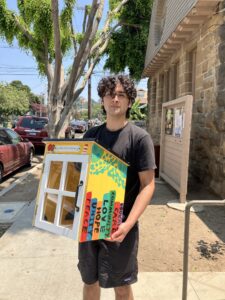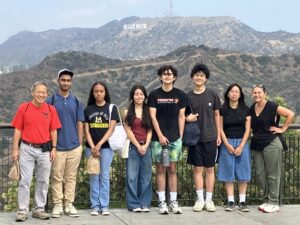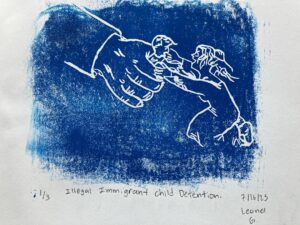[Episcopal News – September 17, 2025] – For Eliana Guevara, meeting with, guiding, and supporting students at the Church of the Epiphany for this summer’s Lincoln High Mentoring Program was more than a homecoming and a dream come true, it was also an education.
“Lincoln Heights is a very small neighborhood and community; not a lot of people are familiar with it,” according to Guevara, 18, a Cal Poly Pomona freshman, and a graduate of the mentoring program. “The impression people have is, it’s not the best area,” she told The Episcopal News.
“I look at other schools, and they have all these resources at their disposal. But Lincoln Heights is a very accepting and welcoming community, especially for people who may not necessarily have the means to develop themselves.”
Offering resources, especially to young people in L.A.’s Lincoln Heights neighborhood, was the dream and vision of Canon Lydia Lopez, whose social justice and civil rights activism alongside United Farmworker co-founders Cesar Chaves and Dolores Huerta inspired creation of the Lydia Lopez Center for Community Empowerment, according to her long-time friend, Grace Dyrness.
“I knew Lydia from being on the streets in demonstrations,” said Dyrness, a board member at the center and an urban planner with Urban Initiatives.
“Because of our Latino roots, mine from Costa Rica, and she was Chicana, we became friends. Then, we were protesting treatment of Salvadorans.”
Lopez died in 2023, after more than 50 years of ministry beginning at Epiphany and extending to the wider Episcopal Church and greater L.A. community. The Rev. Canon Richard Estrada and others wanted to continue her vision by creating the center, said Dyrness.
Initially, efforts to open the center were hampered by federal immigration crackdowns, Estrada’s death in March 2025, and other challenges. Yet, with $100,000 from generous donors, including a $15,000 grant from L.A. Supervisor Hilda Solis’s office, community partnerships are underway, supporting immigrant families facing deportation crises, and providing access to resources and mentoring for youth.
The Rev. John Watson, priest-in-charge at Church of the Epiphany, said the grant from Solis’s office has made it possible for Epiphany to provide free meeting space to local residential groups, such as an immigrant special needs organization, a labor activist association, and a project to make burritos to feed the homeless on Skid Row.
“We’re hoping to have continued donations from individuals interested in the program and the work,” Watson told The Episcopal News. An Epiphany festival and fundraiser is planned for January 2026. “Sadly, funding from the city has been curtailed because of recent developments in the federal government and threats of defunding state work.”
The Rev. Jennifer Gutierrez, president of Clergy and Laity United for Economic Justice (CLUE), said the advocacy group’s partnership with the center offers an opportunity to connect with the people for whom organizations like hers are trying to fix the system.
“We’re looking at structural systems, how to change them, how to make them more just,” she said during a recent telephone interview. The partnership helps “to connect us with people who are in need, who are encountering the injustices we’re trying so hard to change. We get to hear those real stories and connect with real people and families and know why the advocacy work we are doing is so important.”
Gutierrez said that CLUE, working with the Lydia Lopez Center’s chief organizer, have been supporting a young man who’s father was recently deported, connecting him with services and helping him to find his next steps.
The center also partners with IRIS, the diocesan Interfaith Refugee and Immigration Service, who offered that same young man legal advice and assistance.
Arevik Sargsyan is supervisor of legal services for IRIS and spends two days a week at Epiphany, to assist local families and individuals. She hopes to devote more time to outreach, to make the community more aware of the services provided free of charge to them.
“I talk to people I see on the street, and I spread the word, Sargsyan said. “I tell them, I’m here if you need something, let your neighbors know I’m here. I go to stores, the coffee shop and other businesses to tell them I can help with consultations with immigration benefits.”
But many in the community avoid coming in person “because they are afraid, even though some are refugees and count as safe,” she said. Services are offered free of charge and include advice about immigration rights, assistance with applications, citizenship counseling and family reunification, and employment authorization and referrals to medical consultations.
Before interviews with the U.S. Citizenship and Immigration Service, “we prepare them psychologically and legally about what to expect,” she said. “It’s a long process and a lot of work.” We do provide consultations to everyone, even those with pending court cases.
For a dozen or more students, the summer mentoring program at Epiphany is offered free of charge and provides participants with a $200 stipend. Sessions are held Tuesdays, Thursdays and Saturdays, often engaging the city of Los Angeles as a classroom, said Buck Wong, a retired Lincoln High math and social science teacher, who created the mentoring program.
For example, a self-guided tour of the L.A. River became an opportunity to discuss environmental issues, and a walking tour of Chinatown included lessons about the neighborhood’s historical significance and the social ramifications of gentrification. An Epiphany church volunteer led a block printing workshop with linoleum blocks.
“The theme this year for block printing was the Immigration and ICE raids. We tried to combine activities with issues going on in the community,” Wong said.
Students were greatly affected by those raids, he said, noting their reflections in their own words, from the program’s newsletter:
“It’s scary for our family. We’re more cautious and are aware of our surroundings. I carry my work permit. I know of someone … whose father was picked up by ICE. One day, our family heard that ICE was on our street, so we stayed inside our house.”
Or, “Some people think immigrants are the problem, instead of the political system. People should have the right to have asylum. There should be a pathway to citizenship. Immigrants add to our diversity.
“Immigrants are an asset. There has to be a mind shift so that we don’t deport people for no reason.”
And, “with marines being deployed on deportation raids, I see Trump supporters having a dystopian view of the world. The future? I want to be hopeful.”
Guevara had participated in the program for two years before Wong recruited her as a mentor. This summer, she learned a lot about planning, research and preparation, she said.
“It was different, being on the other side,” she said. “I didn’t really know how much actual work and planning went into every single program meeting. Before, I was just there for the activities. I didn’t know about block printing or the gentrification that is happening.
“As a coordinator, you have to be very diligent, planning, and reaching out to guest speakers, or even something as simple as finding the coolest day of the week to go on a walking tour of Chinatown.”

Xavier Ramirez holding up the Free Library Box on before setting it up. Photo Courtesy of Buck Wong.
The experience was rewarding and beneficial for her future, she said, realizing how much student participants gained from the summer activities, including creating a free ‘take a book, leave a book’ library project in front of the church.
“It’s very important for a lot of communities to try and develop mentoring programs, and to be more welcoming and accepting to young people in general.”
The relationship with Epiphany not only reprises the church’s legacy of engaging community and social issues but also represents the congregation’s willingness and its desire to develop that relationship further, and to engage local youth’s interest in their surroundings, said Wong.
“If you learn things in your community, you’re committed to it and develop skills to address them.”


